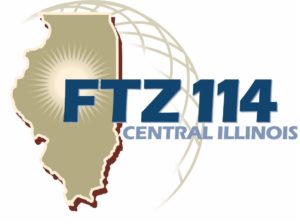Financial Incentives
Greater Peoria offers a variety of financial incentives and support for businesses looking to grow and achieve sustainability. Opportunities for funding are available for nearly every type of business in any size of community. For more information on any of these programs, please do not hesitate to contact us.
Business Incentives
Opportunity Zones
An Opportunity Zone is an economically-distressed community where new investments, under certain conditions, may be eligible for preferential tax treatment. Opportunity Zones are a tool for economic development, designed to connect distressed, low-income communities (urban and rural) with private investment capital, resulting in economic growth and job creation. There are 7 opportunity zones in the region: 5 in Peoria County, 1 in Havana, 1 in Pekin.
Enterprise Zones
The Illinois Enterprise Zone Program is designed to stimulate economic growth and neighborhood revitalization in economically depressed areas of the state. This is accomplished through state and local tax incentives, regulatory relief, and improved governmental services. Benefits include: property tax abatement, permit fee waivers, jobs tax credit, dividend income deduction. interest deduction, contribution deduction, building material sales tax exemption, machinery & equipment/pollution control facilities sales tax deduction, utility tax exemption, and investment tax credit.
Explore Greater Peoria’s 5 Enterprise Zones on our interactive map. Simply add the layer of the Enterprise Zone you want to see.
TIF Districts
Tax Increment Financing, or TIF, is a public financing method that is used as a subsidy for redevelopment, infrastructure, and other community-improvement projects. These districts dedicate sales tax revenues and additional property tax revenues generated within the TIF for improvements within the district to encourage new economic development and job creation. Funds may be used for costs associated with the development or redevelopment of property within the TIF, allowing blighted, declining and underperforming areas to again become viable, and allowing these areas to compete with vacant land at the edge of urban areas.
Projects in TIF districts vary, but could include:
⦁ Redevelopment of substandard, obsolete, or vacant buildings
⦁ Financing public infrastructure improvements, including streets, sewer, water, in declining areas
⦁ Cleaning up polluted areas
⦁ Improving the viability of downtown business districts; rehabilitating historic properties
⦁ Providing infrastructure needed to develop a site for new industrial or commercial use.
Explore Greater Peoria’s 21 TIF Districts on our interactive map. Simply add the layer of the TIF District you want to see.
HUBZones
HUBZone is a US Small Business Administration program for companies that operate and employ people in Historically Underutilized Business Zones (HUBZones). The federal government is required to contract with HUBZone certified small businesses; with an annual goal of 3% for all federal agencies. Major companies such as CAT and John Deere, and government prime contractors have similar requirements. Businesses can be HUB Zone certified if they meet the following criteria:
1. The business must be a “small” business and located in the HUBZone
2. The business must be entirely owned by citizens of the United States.
3. The principal office for the corporation must be in a HUBZone.
4. 35% of a company’s staff including consultants must reside in a HUBZone.
Foreign-Trade Zone #114
 Greater Peoria is in Foreign Trade Zone 114 which provides over two-million square feet of warehousing and distribution space available for general purpose zone usage. Operating within these zones comes with numerous benefits such as lower duties, cost avoidance, staging and showcasing capabilities, and assembly cost savings. For more details contact Sally Hanley, Director of Foreign-Trade Zone #114 at shanley@greaterpeoriaedc.org
Greater Peoria is in Foreign Trade Zone 114 which provides over two-million square feet of warehousing and distribution space available for general purpose zone usage. Operating within these zones comes with numerous benefits such as lower duties, cost avoidance, staging and showcasing capabilities, and assembly cost savings. For more details contact Sally Hanley, Director of Foreign-Trade Zone #114 at shanley@greaterpeoriaedc.org
EDGE Tax Credit Program
llinois’ EDGE program provides annual corporate tax credits to qualifying businesses which support job creation, capital investment and improve the standard of living for all Illinois residents. Initial qualification criteria require certain job creation and project investment requirements.
State of Illinois Department of Commerce and Economic Opportunity offers EDGE Tax Credit– The non-refundable income tax credit is equal to 50% of the income tax withholdings of new jobs created in the state. This percentage increases to 75% if the business expansion project is located in an “underserved area” census tract.
Advantage Illinois Participation Loan Program
With any PLP loan program, financial institutions identify potential opportunities for state participation:
⦁ Standard Participation Loan Program (PLP) – designed to enable small businesses to obtain medium to long-term financing, in the form of term loans, to help grow and expand their businesses. Department participation is subordinated to the lender and has a “below market” interest rate.
⦁ Minority/Women/Disabled/Veteran-Owned Businesses – similar to Standard PLP; however, the amount of financial support may range depending on loan term, MWDV majority control/ownership.
⦁ Revolving Line of Credit (RLOC PLP) – similar to Standard PLP except in the form of a revolving line of credit. Maximum term is two years and further support requires reapplication.
Funding may be used for many purposes, including but not limited to:
⦁ start-up costs
⦁ working capital
⦁ business procurement
⦁ franchise fees
⦁ equipment
⦁ inventory
⦁ as well as the purchase, construction, renovation, or tenant improvements of an eligible place of business that is not for passive real estate investment purposes
TRVDA Industrial Revenue Bonds
The Tri-County River Valley Development Authority (TRVDA) acts as the issuer of the bonds, passing its DOUBLE tax- exempt status on to finance the acquisition of fixed assets including land, buildings, machinery and equipment. Because the interest on the bonds is not subject to state or federal income taxes, investors and lenders require a lower interest rate to achieve an equivalent after-tax return. Therefore, the borrower receives a preferential interest rate, generating substantial savings. Total costs cannot exceed $20 million.
The interest rate available on these bonds is far lower than conventional financing, and you can expect your interest savings to range from 150 – 300 basis points (1.5% – 3.0%) lower than a conventional loan. For example a $5.0 mil bond would save over $1,500,000 in interest over a term of 30 years.
Finance up to 100% of the project cost – contingent upon meeting credit standards of a local bank backing the bond.
Research & Development Tax Credit
The R&D tax credit in Illinois is modeled after the federal R&D tax credit, including the federal definition of qualifying research. It is a non-refundable tax credit equal to 6.5% of qualifying research expenditures that exceed the baseline amount:
⦁ 3 year average of R&D costs in Illinois
⦁ If the taxpayer incurred no qualifying expenditures during a base period year, the qualifying expenditures for that year are zero, even if the taxpayer was not in existence or conducting any business in Illinois during that year
⦁ If the taxpayer was doing business in this State for only part of a base period year, the qualifying expenditures for that year shall be equal to the qualifying expenditures actually incurred, multiplied by 365 and divided by the number of days in the portion of the taxable year during which the taxpayer was doing business in Illinois.
Qualifying Expenses Include:
⦁ Any federally qualifying R&D expenses that are made in Illinois qualify
⦁ Qualified research is defined in IRC section 41(d) and 41(e) and includes the sum of the in-house research expenses, contract research expenses and basic research payments paid or incurred by the business
Illinois Manufacturing Innovation Voucher Program
 Brought to you by IMEC, the goal of the Illinois Manufacturing Innovation Voucher is to support small and mid-sized manufacturers, with 5-500 employees, to embrace new technologies in their products and processes. The Illinois Manufacturing Innovation Voucher will award up to $25,000 in match funding to:
Brought to you by IMEC, the goal of the Illinois Manufacturing Innovation Voucher is to support small and mid-sized manufacturers, with 5-500 employees, to embrace new technologies in their products and processes. The Illinois Manufacturing Innovation Voucher will award up to $25,000 in match funding to:
⦁ Accelerate technology adoption
⦁ Identify and implement productivity improvements
⦁ Overcome organizational growth barriers
Exemption Certificate
(for Manufacturing, Production Agriculture, and Coal and Aggregate Mining)
Effective July 1, 2019, the manufacturing machinery and equipment exemption includes production related tangible personal property, such as supplies and consumables including fuels, coolants, solvents, oils, lubricants, and adhesives, hand tools, protective apparel, and fire and safety equipment, primarily used or consumed in a manufacturing process. The purchaser, at the seller’s request, must provide the information that is needed to complete this certificate.
Community Specific Programs
Peoria County Government Assistance Programs
Through its Government Assistance Program, Peoria County offers 3 levels of assistance through a MICROLOAN (up to $35K or 80% of project), a GAP LOAN (up to $150K or 50% of project), or a MACRO LOAN ( up to $600K or 33% of the project). The interest rate of the loans are generally fixed at 3% below the prime rate, with a minimum rate of 3%
City of Peoria’s IRB
An Industrial Revenue Bond (IRB) is a form of municipal bonding that is designated for use by private manufacturers. Projects within an Enterprise Zone are given preference for IRBs. By providing a reduced financing rate, an IRB gives small manufacturers access to capital (both locally and in national markets) that they ordinarily might not have.
IRB’s can be issued for amounts between $1.5M and $10M, and the interest rate is generally 2.5-3% below prime. These loans can be at fixed or variable rates and usually have terms of 20 years. Unlike many other state and locally-run programs, IRBs can fund 100% of costs. These costs can include purchase of land, buildings and new machinery. Applicants must secure the legal opinion of certified bond counsel.
In 2007, the City of Peoria has been allocated about $9.5M to use for industrial projects.(If this amount is not used for industrial projects, it is allocated for the Assist home buyers program.) Additionally, the state’s Illinois Finance Authority has authority over approximately $80M in separate funds. For more information on this tremendous benefit, please call the Department of Economic Development at (309) 494-8600.
Community Development Block Grant
The Greater Peoria Economic Development Council works with clients to determine if site improvements and/or project development financing fit the CDBG Economic Development program.
Economic Development – Local governments may request a maximum of $1,000,000.00 for gap financing to assist businesses locating or expanding in the community. Funds may be used for machinery and equipment, working capital, building construction and renovation, or improvements to public infrastructure that creates and/or retains jobs in the community.
Morton Microgrant
The Morton MicroGrant provides small grants of up to $5,000 to for-profit business owners interested in starting, moving, or growing a business in Morton. Funds can be used for property improvement or acquisition, equipment purchases, inventory and working capital, and rent subsidies. The Morton MicroGrant is funded through a directed investment with the Morton EDC made by Morton Community Bank. Applications are reviewed on a monthly basis as needed.
IL Bonus Savings
Personal Property Tax Exemption – Illinois does not collect a state tax on personal property. All property other than real estate is exempt from the property tax in Illinois. Thus, all classes of personal property, including machinery, equipment, inventories and intangibles, are exempt.

